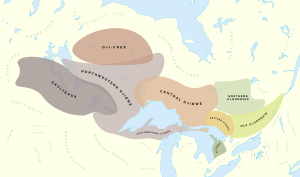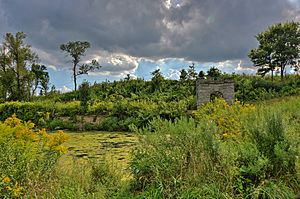Sharon Day (activist) facts for kids
Sharon Day (born 1951) is an Ojibwe leader, activist, artist, and writer from Minnesota. She is a member of the Bois Forte Band of Ojibwe. Day is most known for her special "water walks." During these walks, she and others carry water over long distances. This helps people learn about and care for the health of rivers and lakes.
Contents
Early Life and Background
Sharon Day was born in northern Minnesota. Her parents were Ojibwe from the Bois Forte Band. Day grew up learning about her tribal culture. She remembers carrying water every day, which taught her to respect water deeply.
Day faced challenges growing up. She later studied how to help people with certain problems at the University of Minnesota. After graduating, she worked for the state of Minnesota. Day also became a Midewiwin, which is a spiritual leader in the Anishinaabe faith.
Helping Others: Community Work
In the mid-1980s, Day started hearing about a new health challenge called AIDS. At first, it seemed far away. But in 1987, she learned that two people she knew had HIV. One was Carol LaFavor, an Ojibwe woman. Carol asked Day what she would do to help Native people.
Soon after, Day's brother, Michael, also learned he had HIV. This was very sad news for their family. Day then began helping Native Americans learn about AIDS. This led to the creation of the Indigenous People's Task Force. This group helps the Native American community in Minnesota. They offer health information and support. Day still leads this important organization today.
Protecting Water and the Environment
In 1998, Day joined a group to protect Coldwater Spring. This spring is a sacred place for several Native American tribes near the Mississippi River in south Minneapolis, Minnesota. People wanted to build a highway near it. Day helped protest these plans. She believed that protecting sacred places was very important.
By 2003, Day began leading special "Nibi Walks." Nibi means water in the Ojibwe language. These walks involve carrying water along a river. They are like a long prayer for the water. The walkers often follow the river's flow for many miles.
The Four Directions Water Walk
In 2011, Day helped organize a "four directions water walk." Water was brought from the Pacific Ocean, Atlantic Ocean, Arctic-Hudson waterway, and the Gulf of Mexico. All this water was brought together and poured into Lake Superior. Day carried water from the Gulf of Mexico.
Day sees these walks as part of her spiritual practice. In her culture, women traditionally care for the water. On Nibi Walks, only women carry the water. Day believes it is important to protect water for future generations. She says, "It is our intention to make sure there is water to nourish our great-great-great grandchildren seven generations into the future."
Missouri River Walk
In 2017, Day led a 54-day water walk along the Missouri River. It started in Montana and ended in Missouri. The group took turns carrying a pail of water from the river's beginning. Day says these walks help people understand water pollution. She describes bringing clean water from the start of the river to its end as "giving the river a taste of herself."
Day has also spoken out against using fossil fuels. In 2013, she wrote that protecting the land and traditional ways was more important than making money from oil. She believes renewable energy is a better choice. In 2015, Day helped protest oil pipelines in Minnesota. She said, "These waterways are our lifeblood. If you want your grandchildren’s grandchildren to have life and clean water, then we must all do what we can.”
Artist and Writer
In 2003, Day helped edit a book called Sing! Whisper! Shout! Pray! Visions for a Just World. This book is a collection of essays and poems. It shares ideas for a fair and equal world for everyone. It shows how women of color have always been important in movements for fairness.
In 2018, Day's play, We Do It For The Water, was performed in Minneapolis. Young Native performers acted in the play. It shared a message of peace and working together to protect water.
After the events of summer 2020 in the Twin Cities, Day felt inspired to create art. She made a large sculpture called Tree of Peace, Tree of Life, Tree of the Future. It was a 12-foot tall tree made of driftwood. People added leaves to the tree with their wishes and prayers. The sculpture was shown at the Minnesota state capitol in October 2020. It later traveled to art galleries and found a permanent home with the Piscataway people in Maryland.
Day was also featured in a short film called Nibi Walk. This film was shown at the 2020 Environmental Film Festival in Washington D.C.



